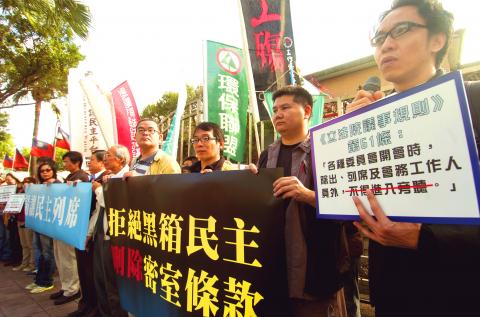A group of citizen journalists yesterday demanded that the legislature uphold the Constitution by recognizing citizen journalism and allowing the public to attend legislative sessions after their attempt to cover legislative affairs was rejected.
As the nation’s top legislative body, the legislature should not violate the Constitution by barring citizen journalists and legislation session visits, several citizen journalists and dozens of representatives from civic groups said during their protest in front of the legislature in Taipei which coincided with Constitution Day.
“Taiwanese should not be stripped of their constitutionally protected right to political participation,” Citizen Congress Watch chairman Shih Shin-min (施信民) said before the protesters tried to enter the legislature and apply for temporary media passes.

Photo: Wang Min-wei, Taipei Times
After being blocked by security at the gate of the legislative building for about 10 minutes, six representatives — including citizen journalist and documentary filmmaker Kevin Lee (李惠仁) — were allowed to enter, but their media pass applications were immediately rejected.
Lee Chien-hsin (李健行), director of the legislature’s Public Relations Office, said the requirements for obtaining media passes are clearly stated in the legislature’s regulations.
“If you [citizen journalists] have a problem with that, you should demand a Constitutional interpretation,” he said.
Citing Article 11 of the Constitution, which guarantees the rights to freedom of speech, teaching, writing and publication, and the Justices of the Constitutional Court’s Interpretation No. 689 as the basis of their appeal, Kevin Lee briefly argued with the PR office director, who subsequently left the scene without further explanation.
Currently, only reporters from media outlets which are registered companies are eligible for permanent media passes to cover legislative affairs.
“The legislative regulations are in violation of the Constitution,” said Kevin Lee, who is known for exposing the government’s cover-up of an avian flu outbreak earlier this year.
The protesters said the legislature’s refusal to recognize citizen journalism constitutes not only an erosion of constitutional rights, but also jeopardizes freedom of the press, which is already in a dire state amid growing Chinese influence in the media, as well as increasingly powerful media bias and corporate interests.
It is also important that the legislature allow professionals and private citizens to attend public hearings and legislative sessions, said Huang Shu-ying (黃淑英), a former Democratic Progressive Party legislator who now serves as president of civic group Taiwan Women’s Link.
In related news, the Association of Taiwan Journalists yesterday condemned the government’s infringing on press freedom and violation of the Constitution in its actions concerning the Fourth Nuclear Power Plant in New Taipei City’s (新北市) Gongliao District (貢寮), and the Miramar Resort Village in Taitung County’s Shanyuan Bay (杉原灣).
The Atomic Energy Council on Friday barred a reporter from covering meetings and activities related to the power plant, while the Taitung County Government barred reporters from an environmental assessment meeting for the controversial resort development.
“The Association of Taiwan Journalists condemns the practices by the central and local governments to systematically oppress the media freedom and strip reporters’ rights to gather information, which is a serious trampling of press liberties and a violation of the Constitution,” the association said in a press release.

A strong continental cold air mass is to bring pollutants to Taiwan from tomorrow, the Ministry of Environment said today, as it issued an “orange” air quality alert for most of the country. All of Taiwan except for Hualien and Taitung counties is to be under an “orange” air quality alert tomorrow, indicating air quality that is unhealthy for sensitive groups. In China, areas from Shandong to Shanghai have been enveloped in haze since Saturday, the ministry said in a news release. Yesterday, hourly concentrations of PM2.5 in these areas ranged from 65 to 160 micrograms per cubic meter (mg/m³), and pollutants were

Taiwan’s armed forces have established response protocols for a wide range of sudden contingencies, including the “Wan Chun Plan” to protect the head of state, the Ministry of Defense (MND) said today. After US President Donald Trump on Saturday launched a series of airstrikes in Venezuela and kidnapped Venezuelan President Nicolas Maduro, concerns have been raised as to whether China would launch a similar “decapitation strike” on Taiwan. The armed forces regularly coordinate with relevant agencies and practice drills to ensure preparedness for a wide range of scenarios, Vice Minister of National Defense Hsu Szu-chien (徐斯儉) told reporters before a

EVA Airways on Saturday said that it had suspended a pilot and opened an investigation after he allegedly lost his temper and punched the first officer several times as their plane was taxiing before takeoff at Los Angeles International Airport. According to a report published on Thursday by The Reporter, the incident occurred after the flight’s Malaysian first officer tried to warn the Taiwanese pilot, surnamed Wen (文), that he was taxiing faster than the speed limit of 30 knots (55.6kph). After alerting the pilot several times without response, the first officer manually applied the brakes in accordance with standard operating

The New Taipei City Social Welfare Department on Thursday celebrated Paralympic competitor Chen Tzu-wei (張孜維), who received last year’s national Golden Eagle award for exemplary achievement by Taiwanese with disabilities. Chen, who suffers from childhood-onset muscular dystrophy, did not attend the first award ceremony held by the Ministry of Health and Welfare in November due to illness. Chen was formally presented with the award at the department, where he gave thanks to government workers for supporting his education and livelihood, the department said in a statement. Chen was raised by the Ai-hsin Home for Persons with Disabilities in the city’s Bali District (八里)